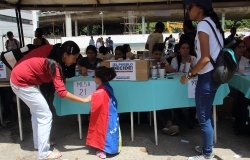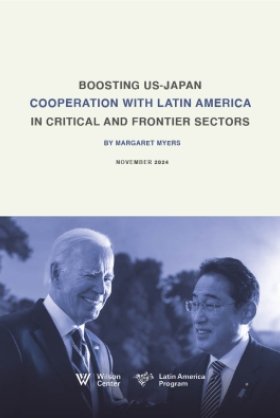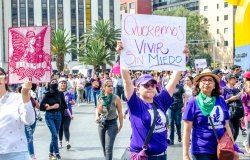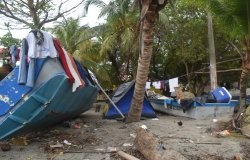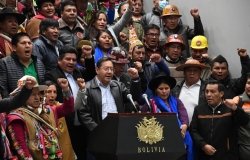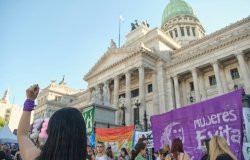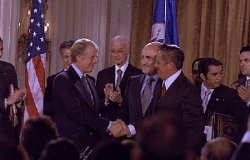Fifteen Years After the Peace Agreement: Problems of Peace-Building in El Salvador
With Rubén I. Zamora, President of CAPAZ Foundation and UNDP consultant
Overview
Fifteen years after the peace agreement that ended a twelve-year civil war between the Salvadoran government and the FMLN guerilla movement, El Salvador continues to be faced with a number of challenges: strengthening representative democracy, promoting economic growth, and addressing social problems such as crime, poverty, and inequality. On November 1, 2006, Rubén I. Zamora, president of the CAPAZ Foundation, presidential candidate in El Salvador in 1994 and 1999, and a former Woodrow Wilson Public Policy Scholar, joined the Latin American Program to discuss "Fifteen Years After the Peace Agreement: Problems of Peace-Building in El Salvador." Zamora focused on the major achievements over the last 15 years, the main obstacles to peace-building, and prospects for the future.
Zamora identified three fundamental achievements in building representative democracy over the past fifteen years. First, violence is no longer the principal instrument of politics. The second major achievement is the demilitarization of political life; the military has been reduced and purged and removed from matters of internal security. Third, reforms of the institutional apparatus of the state include the creation of a human rights ombudsman's office, changes in the penal code, and improvements in the way that Supreme Court justices are elected.
Despite this progress, Zamora highlighted a number of obstacles to democratic consolidation, including social and economic inequality, social disintegration, and the de-institutionalization of political life. The 1992 peace agreement contained within it a basic ambiguity, rooted in the twin goals of building participatory democracy while pursuing neo-liberal economic reforms. The economic model embraced by the conservative government of the ARENA party was by definition exclusionary and tended toward concentrating income, at the same time that the peace accords strove to expand participation at the political level. Whereas in theory economic reform and democracy go together, Zamora asserted, in practice, and what El Salvador is experiencing, is a clash between those two objectives. Zamora pointed out that, during the peace negotiations, both sides agreed on the need to address political exclusion, but they did not agree on a strategy for tackling social and economic exclusion, one of the root causes of the civil war.
A second obstacle involves social disintegration, reflected in unprecedented rates of crime and the breakdown of the family due to emigration. Zamora noted that although the number of arrests has risen in recent years, crime has increased even more, overwhelming the police force. The transformation of the youth gangs known as maras into organized crime structures and the U.S. policy of deporting criminals back to El Salvador have worsened the problem of public security. Family structures are also disintegrating because of migration to the United States, which has divided families.
The third major obstacle to democratic strengthening, Zamora said, is the de-institutionalization of political life, reflected most notably in the failure of political parties to adjust and reform in the post-war period, in order to assume their new role in a democratic society. The failure of reform—and the continuation of old practices of patronage and clientelism—has resulted in the re-polarization of politics. Consensus-building has also been hindered by the lack of debate within society over the fundamental problems of the country.
Looking towards the future, Zamora argued that El Salvador is facing the "first organic crisis of the post-war period." The economy is not growing, with growth rates standing at 2 percent annually or less. New strategies for development advanced by opposition parties focus on reconstructing institutional democracy, addressing problems of security, and developing social programs to tackle issues of extreme poverty and inequality. He noted that given El Salvador's lack of natural resources to generate revenues, funding for development programs must be made available through tax reform.
Representative democracies resolve crises through elections, Zamora said, but the private sector is committed to blocking the FMLN from coming to power. While many in the private sector are not satisfied with the current government, they consider the alternative (the FMLN) to be worse and will not financially support opposition candidates who might govern in alliance with the FMLN. The FMLN itself has no clear understanding of what direction to move in following the death of party leader Shafik Handal. Zamora said that some members of the FMLN are beginning to consider searching for presidential candidates from outside the party, who might have a better chance at uniting the country. This, however, is not necessarily a majority view.
Asked whether a new generation of leaders is emerging in El Salvador, Zamora responded that many young people are afraid to participate in politics given the country's history of political violence. In addition, old leaders are reluctant to give up power. New leadership will not necessarily arise from local governments, he said, citing cases of corruption and anti-democratic practices at the local level.
Hosted By

Latin America Program
The Wilson Center’s prestigious Latin America Program provides non-partisan expertise to a broad community of decision makers in the United States and Latin America on critical policy issues facing the Hemisphere. The Program provides insightful and actionable research for policymakers, private sector leaders, journalists, and public intellectuals in the United States and Latin America. To bridge the gap between scholarship and policy action, it fosters new inquiry, sponsors high-level public and private meetings among multiple stakeholders, and explores policy options to improve outcomes for citizens throughout the Americas. Drawing on the Wilson Center’s strength as the nation’s key non-partisan policy forum, the Program serves as a trusted source of analysis and a vital point of contact between the worlds of scholarship and action. Read more
Thank you for your interest in this event. Please send any feedback or questions to our Events staff.


